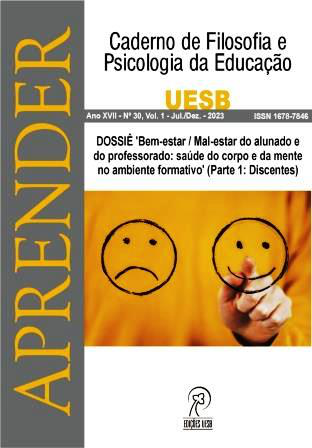The concept of identification in Adorno's thought: between social adjustment and resistance towards a more human existence
DOI:
https://doi.org/10.22481/aprender.i30.12990Keywords:
Identification, Psychoanalysis, Social adaptation, Independence, ResistanceAbstract
This article discusses Adorno's use of the concept of identification. Therefrom, we seek to emphasize the theme of criticism and the negation of culture made possible by the author's appropriation of psychoanalysis. The application of the concept allows us to analyze the assimilation process of the individual in late capitalism, since culture is transformed into merchandise, and thus absorbs the identical and repetitive rhythm of mechanized production, which is transmitted to individuals through the products they consume and the celebrities with whom they identify. In this context, the feeling of individual impotence grows, generated by a model of social organization that conceals its contradictions from the individual's identity with culture. And it reveals the union between progress and barbarism that promotes the decline of the individual as was exposed in the Dialectic of Enlightenment. As Adorno suggests, faced with the irrationality of modern culture, education is responsible for the task of critical self-reflection and the enlightenment of individuals, in order to invite them to think about the false reality in which they are inserted and to contrast powerlessness with autonomy.
Downloads
References
ADORNO, Theodor W. La técnica psicológica de las alocuciones radiofónicas de Martin Luther Thomas. In: ADORNO, Theodor W. Escritos sociológicos II. Vol. 1. Madri: Ediciones Akal, 2008.
ADORNO, Theodor W. A psicanálise revisada. In: ADORNO, Theodor W. Ensaios sobre psicologia social e psicanálise. Trad. Verlaine Freitas. São Paulo: Editora Unesp, 2015a.
ADORNO, Theodor W. Sobre a relação entre sociologia e psicologia. In: ADORNO, Theodor W. Ensaios sobre psicologia social e psicanálise. Trad. Verlaine Freitas. São Paulo: Editora Unesp, 2015b.
ADORNO, Theodor W. ADORNO. O que significa elaborar o passado. In: Theodor W. Educação e emancipação. Trad. Wolfgang Leo Maar. 5. ed. Rio de Janeiro: Paz e Terra, 2022a.
ADORNO, Theodor W. ADORNO. Educação após Auschwitz. In: Theodor W. Educação e emancipação. Trad. Wolfgang Leo Maar. 5. ed. Rio de Janeiro: Paz e Terra, 2022b.
ADORNO, Theodor W; HORKHEIMER, Max. Dialética do esclarecimento: fragmentos filosóficos. Trad. Guido Antonio de Almeida. Rio de Janeiro: Zahar, 1985.
BENJAMIN, Walter. Magia e técnica, arte e política: ensaios sobre literatura e história da cultura. Trad. Sergio Paulo Rouanet. 3. ed. São Paulo: Brasiliense, 1987.
FREUD, Sigmund. Psicologia das massas e análise do Eu. In: Cultura, sociedade, religião: O mal-estar na cultura e outros escritos. Tradução Maria Rita Salzano Moraes. Belo Horizonte: Autêntica, 2021a.
FREUD, Sigmund. O mal-estar na cultura. In: Cultura, sociedade, religião: O mal-estar na cultura e outros escritos. Tradução Maria Rita Salzano Moraes. Belo Horizonte: Autêntica, 2021b.
HORKHEIMER, Max. Meios e fins. In: HORKHEIMER, MAX. Eclipse da razão. Tradução de Sebastião Uchoa Leite. São Paulo: Editora Centauro, 2002.
HORKHEIMER, Max; ADORNO, Theodor W. Temas básicos da sociologia. São Paulo: Editora Cultrix, 1973.
ROUANET, Sergio Paulo. Teoria crítica e psicanálise. Rio de Janeiro: Tempo Brasileiro, 1989.
Downloads
Published
How to Cite
Issue
Section
License
Copyright (c) 2023 APRENDER - Caderno de Filosofia e Psicologia da Educação

This work is licensed under a Creative Commons Attribution-ShareAlike 4.0 International License.






